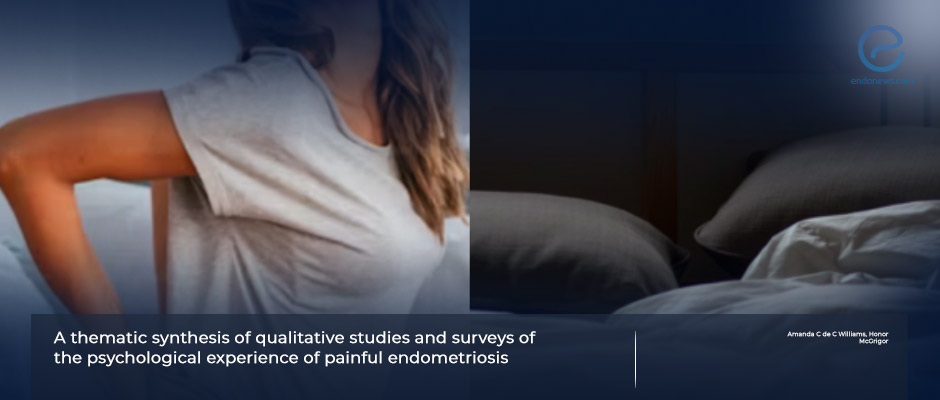Psychological effect of endometriosis due to chronic pelvic pain
Mar 27, 2024
Psychological evaluation of women with endometriosis and inclusion of psychological management into their medical care will improve quality of their life.
Key Points
Highlights
- The development of psychological models to understand the psychological stress caused by endometriosis-related pain will contribute to the physical and spiritual recovery of endometriosis patients.
Importance
- Resolving pain-related psychological problems is pivotal in women with endometriosis.
What’s done here?
- This systematic search was designed to investigate the extent to which studies in the literature evaluated the psychological effects caused by endometriosis-related pain.
- Literature was comprehensively scanned with keywords including endometriosis, pelvic pain, quality of life, and experience.
- Thematic synthesis was performed to obtain information from surveys and qualitative studies.
Key results
- One hundred and nine studies were selected: Quality of life, pain, pain-associated psychological symptoms, and sexual activity about quality of life were questioned.
- In all studies, more pain was found to be associated with poorer quality of life (often health-related quality of life), greater impact of endometriosis on life, or poorer psychological health.
- Endometriosis was found to be a reason for loss of identity, freedom, and imagined future.
- Endometriosis-associated pain was different from any other pain etiologies qualitatively and quantitatively.
- Endometriosis could affect the body beyond pain because of unpredictable bleeding, effects on the bowel, bladder, appetite, energy, and sleep, comorbidities, and discomfort with sexual activity.
- Self-doubt, anxiety, depression, and a general sense of being unable to function adequately were more commonly encountered in women with endometriosis, most of the time due to experienced pain.
- Social life and work, and romantic or sexual partners, were negatively affected.
- Infertility, recurrence of endometriosis or worsening following unsuccessful treatment, extreme pain, development of cancer (the diagnosis having been missed, or developing in the future) and genetic transmission of endometriosis to daughters were the most common fears in endometriosis patients, respectively.
Strengths and Limitations
- Broad search and not limited to the English language were the strengths.
- Focusing only on the experience of women, not focusing on their sexual partners, was the main limitation.
- Especially survey data could be misleading since the patients were self-respondents.
Lay Summary
The most common symptoms of endometriosis are dysmenorrhea, dyspareunia, and chronic pelvic pain, all of which affect the quality of women’s lives. Early diagnosis and management are important as endometriosis impairs the quality of life of patients and creates a serious social and economic burden.
Two scientists from the Department of Clinical, Educational & Health Psychology, University College London, United Kingdom, published “A thematic synthesis of qualitative studies and surveys of the psychological experience of painful endometriosis” in the BMC Women’s Health. The authors sought to investigate the extent to which studies in the literature evaluated the psychological effects caused by endometriosis-related pain.
The authors scanned all literature comprehensively with keywords including endometriosis, pelvic pain, quality of life, and experience. Surveys and qualitative studies were included and thematic synthesis was performed. Quality of life, gynecological pain, and pain-associated psychological symptoms were the most common topics that were considered in the studies, however, sexual activity concerning quality of life was another topic that was questioned.
Endometriosis-associated pain was different from any other pain etiologies qualitatively and quantitatively. Several psychological problems such as self-doubt, anxiety, depression, and a general sense of being unable to function adequately are probably the result of endometriosis-associated pain. The most common fears in endometriosis patients were infertility, recurrence of endometriosis or worsening following unsuccessful treatment, extreme pain, development of cancer (the diagnosis having been missed, or developing in the future), and genetic transmission of endometriosis to daughters, respectively.
“Better understanding of the particular psychological threats of endometriosis, and integration of this understanding into medical care with opportunities for psychologically-based pain management, would substantially improve the experience and quality of life of women with painful endometriosis,” they added.
Research Source: https://pubmed.ncbi.nlm.nih.gov/38238741/
pelvic pain infertility social impact quality of life delayed diagnosis treatment failure fear of disease progression

